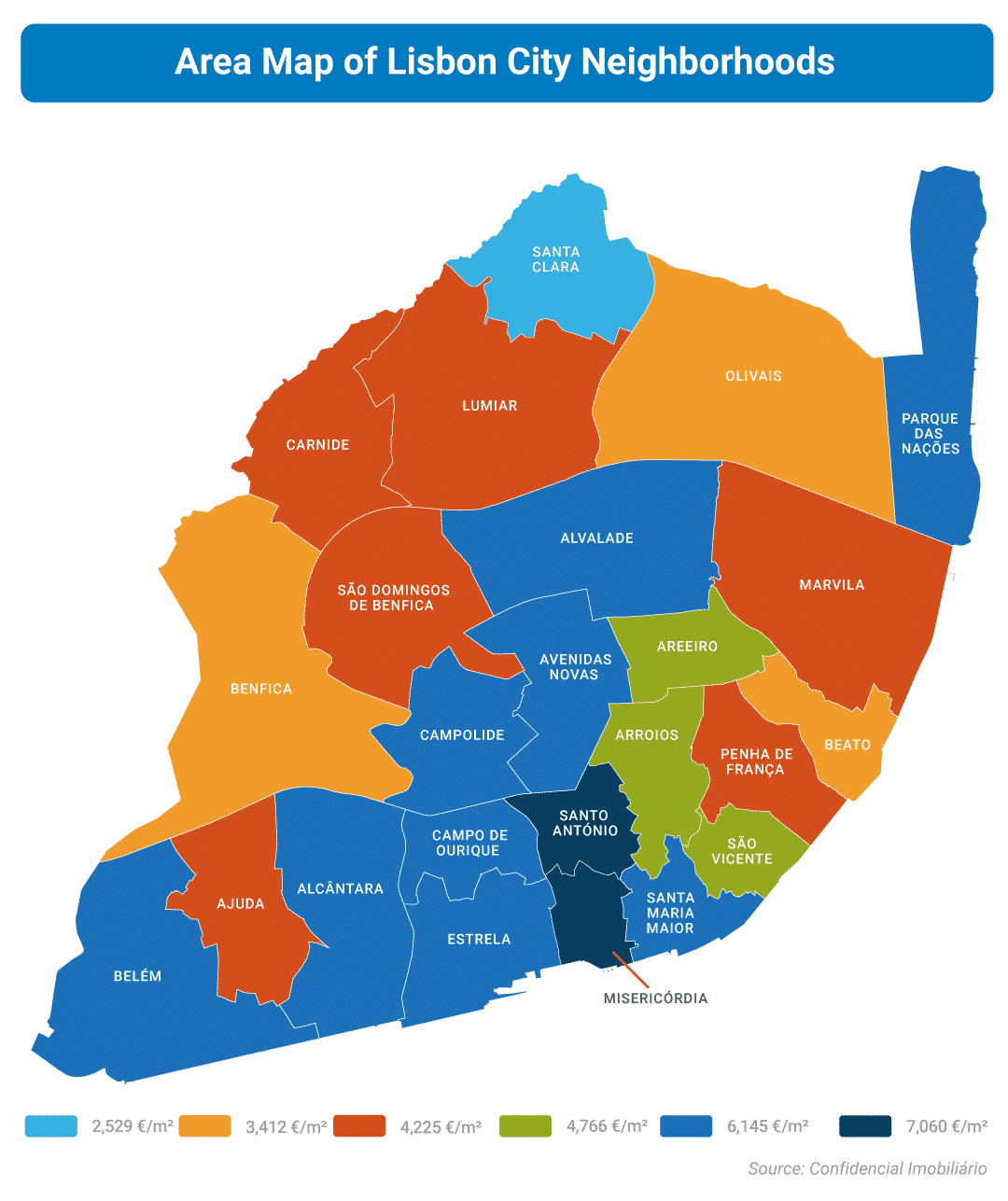With its unique charm and rising prominence among other Western European capitals, Lisbon offers a compelling opportunity for property acquisition. However, navigating the real estate market in Lisbon can be a strategic move, whether you’re considering an investment or a place to call home.
In this comprehensive guide to buying property in Lisbon, we delve into the key aspects of the city’s real estate landscape. From identifying the best areas to buy property in Lisbon to understanding average prices in each area, we aim to equip you with valuable insights.
Here’s what you’ll find in this article:
- The best areas to buy property in Lisbon
- Expert tips for buying Lisbon real estate
- An overview of the property buying process in Lisbon and more!
Where is the best place to buy property in Lisbon, Portugal?
Over the past few years, buying property in Lisbon has become hugely popular with investors worldwide and those who move to the city to make it their home. As Portugal’s capital city, the municipal area is a major tourist hub for the country and the rest of Europe. Additionally, the picturesque city has a buzzing pulse and a rich cultural history, making property in Lisbon a popular investment.
Many foreigners buy property in Lisbon because they’re surprised by how much each neighborhood varies in individuality and character, even in a relatively small city. If you want to purchase property in Lisbon, it helps to know more about the different neighborhoods and what each one offers. In this comprehensive guide, you’ll find all the information about the advantages of all the different areas.
Whatever your priorities are in your property search, whether you aim to find great investment opportunities, buy a property that will provide rental income, or search for the best neighborhood to live in, Lisbon offers a wide range of options. As such a broad spectrum of properties are available, you have a good chance of finding a property that suits your needs, from the artsy to chic or from budget to upscale and luxurious.
Considering all these factors, here are some of the best neighborhoods in the capital city.
What is it like to live in the areas of Baixa and Chiado?
These areas are generally referred to as downtown Lisbon. They are also among the go-to places for tourists. They are flanked on one side by Praça do Comércio and on the other side by Avenida da Liberdade and Baixa, and their surroundings are also very pedestrian friendly. If you’re looking to find somewhere that is conveniently located, but also has all the charm of the Portuguese capital’s historic streets, this is the right spot. It is also close to the main shopping district and big brand stores, with good transport links to the rest of the city.
Property prices in Baixa and Chiado
The freguesia (municipal district) of Santa Maria Maior is where major landmarks such as Lisbon’s city hall and Lisbon Cathedral are located. It encompasses the neighborhoods of Baixa and Chiado, and it is one of the most expensive places to buy property in Lisbon. Property costs, on average, €6,145per m².
Advantages of living in Baixa and Chiado
Property in Baixa and Chiado is very highly valued, and housing prices are rising fast. Rent prices in this area are also very high, making it an ideal location for investment.
Specialist advice If you are looking for expert advice on buying property in Lisbon, or buying property in Portugal, it can help to talk to a specialist. Our team at Global Citizen Solutions partners with reputable local real estate agents and can provide you with a personalized plan for purchasing a home in Portugal. Get in touch to find out more about your investment options.
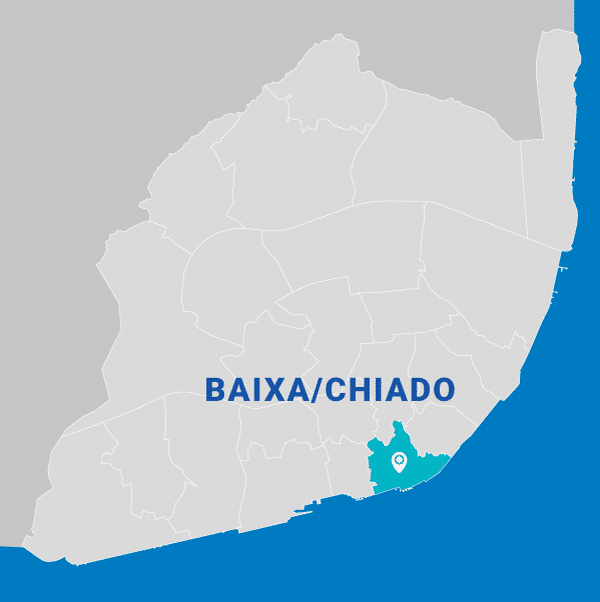
What is it like to live in Bairro Alto?
This neighborhood comes to life after midnight. It has boutique hotels, bars, restaurants, and graffitied houses. Due to the number of bars, homes in the streets uphill from the Praça de Luís de Camões can be very noisy.
Some quieter spots can be found around Santa Catarina and Bica, although the whole neighborhood is transformed into a massive street party for the summer in June.
Most of the streets in this neighborhood are very hilly and narrow, and parking is very limited. This also means that it has some of the best views in the city, with many apartments having incredible views over the River Tagus.
Property prices in Bairro Alto
Property in the Lisbon neighborhood of Bairro Alto (in the Misericórdia neighborhood) costs, on average, €6,825 per m².
Advantages of living in Bairro Alto
Much like Baixa and Chiado, property in Bairro Alto is very highly valued and highly sought after. It is particularly popular with foreign exchange students, as it is centrally located and also close to Lisbon’s best nightlife spots.
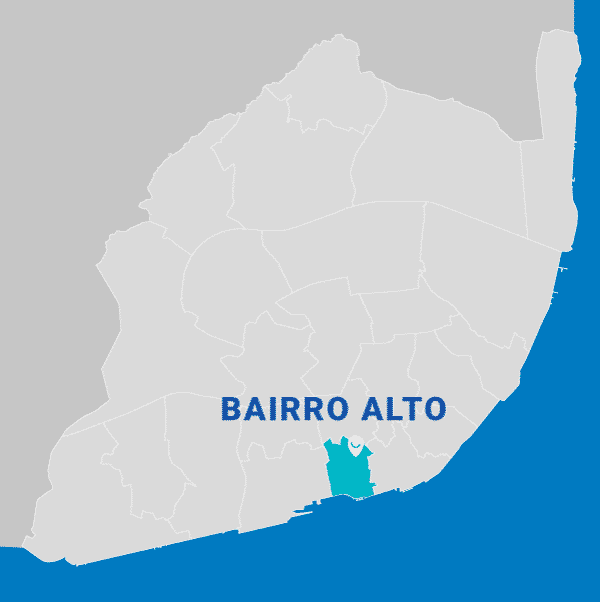
What is it like to live in Lapa and Santos?
Located west of the city center, buying property in Lisbon neighborhoods of Lapa and Santos are quieter and more residential. If you want to live in a historical neighborhood without all the noise and bustle of Baixa or Bairro Alto, this is a good spot to pick. In recent years, Santos has become an increasingly attractive area among young international professionals, making it one of the best neighborhoods in Lisbon.
At the same time, many cafes and restaurants have opened up in the area, making it an even more interesting place to live.
Property prices in Lapa and Santos
Property prices in Lapa and Santos (both in the Estrela neighborhood), cost on average, €5,670 per m².
Advantages of living in Lapa and Santos
For buying property in Lisbon, this up-and-coming area has everything going for it: It is central but also quiet, and it offers affordable prices compared to places such as Bairro Alto and Baixa.
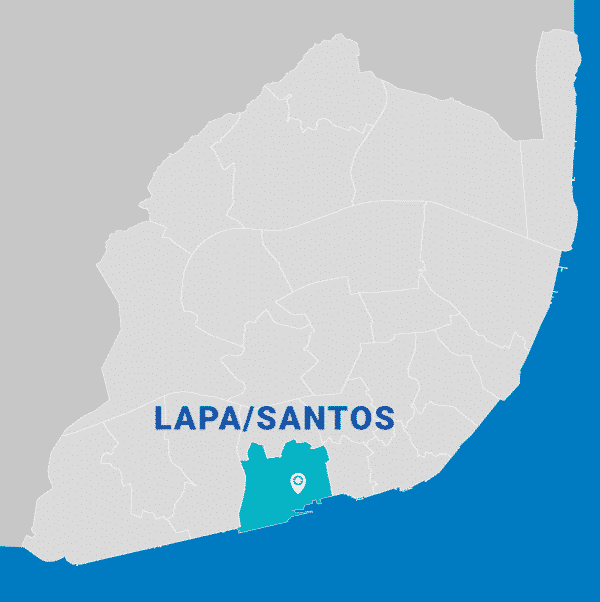
What is it like to live in Avenidas Novas?
This is an upscale district with luxury apartments, wide avenues, and aristocratic art nouveau palaces. It is also home to the beautiful Parque Eduardo the VII and is close to Avenida da Liberdade, one of the priciest avenues in the world. Avenida Novas is also well connected by public transportation and quite central. However, it can be chaotic during rush hours because of the number of cars transiting through the area.
Property prices in Avenidas Novas
Property costs, on average, €6,046 per m².
Advantages of living in Avenidas Novas
Buildings in the area of Avenidas Novas tend to be newer than other parts of the center, as well as more spacious.
For more information check out our property guide on Avenidas Novas here.
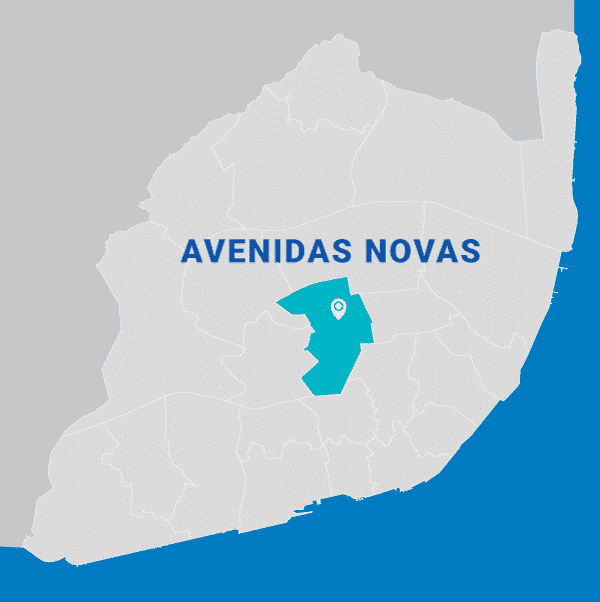
What is it like to live in Intendente and Mouraria?
This is one of the more central areas of Lisbon, which is gradually being gentrified. It is very multicultural, fast-paced, and hippy. There is also an abundance of renovation projects going on here. You will also find several Chinese and Indian supermarkets here if you are looking for some special cooking ingredients. It is also well-served by public transport.
Property prices in Intendente and Mouraria
Average prices in Intendente (in the Arroios neighborhood) are €4,766 per m², and property prices in Mouraria (in the Santa Maria Maior neighborhood) are €6,145 per m².
Advantages of living in Intendente and Mouraria
Intendente and Mouraria have been rapidly gentrified in recent years and are fast becoming one of the most attractive places in Lisbon to buy property. Despite being very close to the center, prices are still comparatively low.
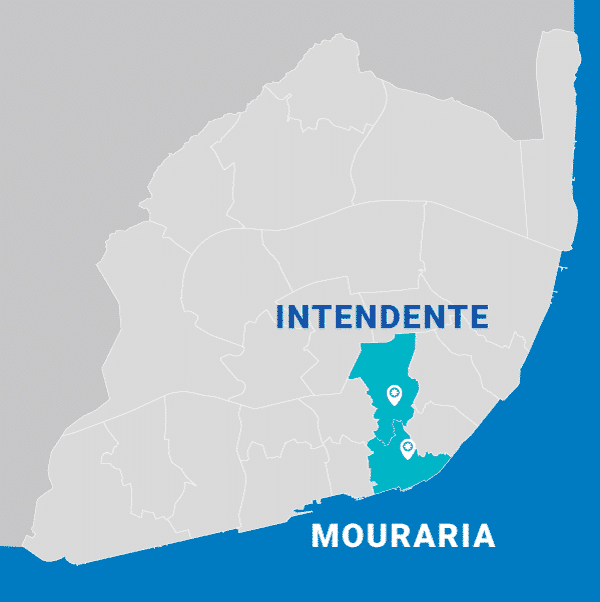
Property specialists
Looking to Secure Your Dream Property in Portugal? Get in touch with our real estate division, Goldcrest Real Estate - Portugal´s buyer's agent, to kickstart your property search in Portugal.
As the first buyer’s agent in Portugal, Goldcrest has a clear understanding of the local market and has helped hundreds of people find their ideal property.
Working solely on behalf of the buyer, they secure the best price for you, saving you time and hassle.

What is it like to live in Campo de Ourique?
Located to the west of the city center, Campo de Ourique is a pleasant and residential neighborhood that is very family orientated, with many family properties available. It is also a quiet area away from the bustling parts of the city with lovely squares and gardens. It is also well served by public transportation (mainly buses).
Property prices in Campo de Ourique
The average price of property in Campo de Ourique is €5,561 per m².
Advantages of living in Campo de Ourique
Campo de Ourique has everything you might want in a neighborhood, such as shops, transport, and green spaces, but it is a far calmer place to live those areas which are closer to the center.
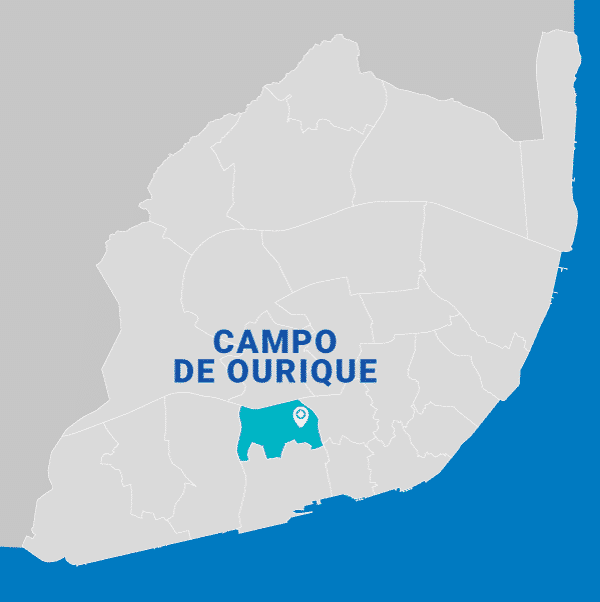
What is it like to live in Alfama and Graça?
This is Lisbon’s oldest neighborhood. The most distinguishing characteristic of Alfama is its labyrinth narrow streets and alleyways. It is also home to traditional Portuguese folk music and the Castelo de São Jorge and Fado. This retains some old charm that goes as far back as the 17th century, and even in some quarters, it is referred to as a village in a city. However, the Alfama neighborhood has seen development in recent years as property owners are remodeling their apartments to use them for holiday rentals.
Property prices in Alfama and Graça
The average price for Alfama (in the Santa Maria Maior neighborhood) is €6,145 per m², whereas property in Graça (in the São Vicente neighborhood) is slightly cheaper at €4,514 per m².
Advantages of living in Alfama and Graça
Graça and Alfama are the neighborhoods of Lisbon that feel the most authentically Portuguese. With the narrow winding streets and charming trams rattling up and down the hills, it feels almost like stepping back in time.
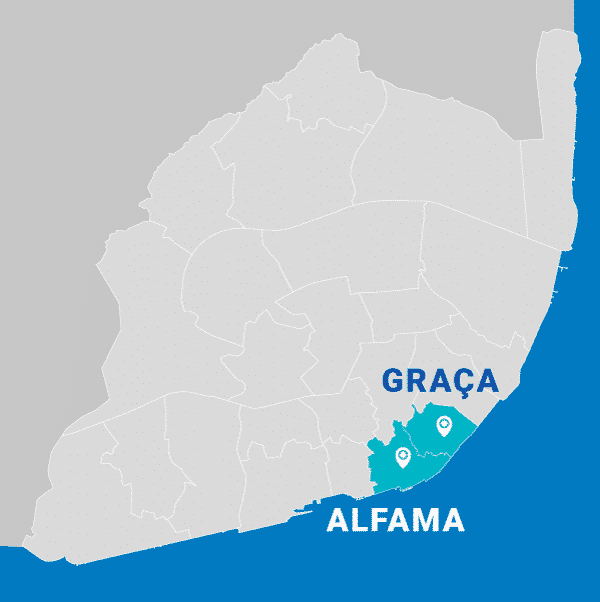
What is it like to live in Belém, Ajuda, and Restelo?
This is the last neighborhood within the Lisbon municipality. It is a historic neighborhood with many museums and monuments, large gardens and parks, and potentially your dream property. Ajuda and Restelo are also in and around the Belém district. They are tranquil and safe neighborhoods with houses, villas, and apartments with good views of the Tagus River and the Ponte 25 de Abril.
Property prices in Belém, Ajuda and Restelo
In Ajuda the average price of property is €3,989 per m², while in Belém and Restelo it is a little bit more expensive at €5,395 per m².
Advantages of living in Belém, Ajuda and Restelo
The pleasant parks and quiet streets are just a few of the attractions in these historic neighborhoods.
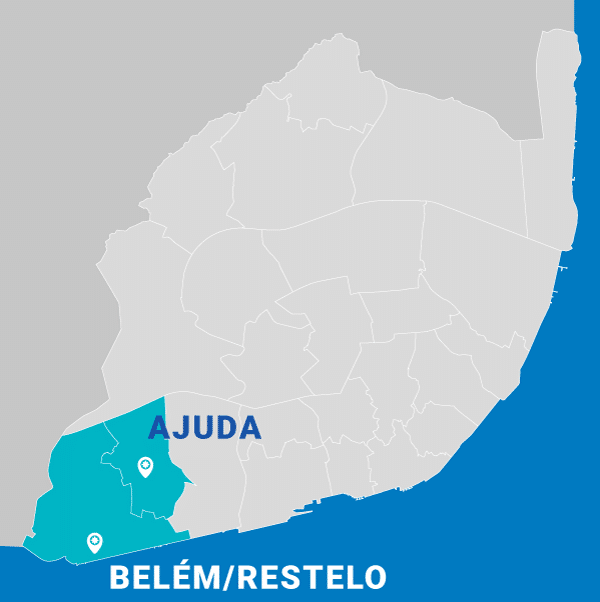
What is it like to live in Parque das Nações?
This modern neighborhood is made up of modern high-rise residential buildings and hotels. This area is generally quiet except when there is a big conference or event in Lisbon. It is also easy to forget you live in Lisbon if you stay in this area because the feeling in these parts is very much different from neighborhoods close to the center.
Property prices in Parque das Nações
In Parque das Nações the average price of property is €5,965 per m².
Advantages of living in Parque das Nações
Though the prices are higher than many other neighborhoods in Lisbon, its architecture and housing are far more modern and futuristic than most other areas of the city.
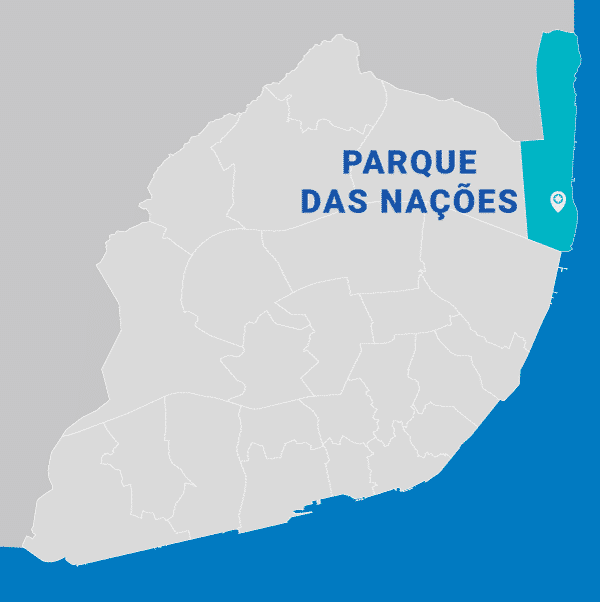
Living on the Outskirts of Lisbon vs the City Center
As the price of property in Lisbon becomes increasingly more expensive, many people are looking further away from the center to find better property deals. Cheaper areas of Lisbon include neighborhoods such as Beato, Marvila, Campolide, and Benfica.
The main advantage of living in areas further from the city center is that the property is cheaper and usually bigger as well. The disadvantage is obviously in their distance from the center, which can be particularly noticeable when it comes to transport. They are also significantly quieter when it comes to restaurants and nightlife.
Up-and-coming areas of Lisbon
Some other up-and-coming areas to buy property in Lisbon include Marvila and Beato. These formerly industrial areas are now home to a number of creative spaces and industries, as well as micro-breweries, and can be a good choice when it comes to investing in property in Lisbon.
How to Invest in Real Estate in Lisbon, Portugal
Lisbon’s real estate market offers great opportunities for purchasing property.
It’s worth noting that the Portuguese Golden Visa program pathway to invest in residential properties is no longer viable as of 1 January 2022. Those looking to qualify for the Golden Visa should explore other avenues to make a qualifying foreign investment.
Those not looking to apply for the program will find a rich property market in Portugal’s sunny capital. In this section, we’ll examine how to invest in real estate in Lisbon.
When buying a property, you must follow the steps outlined below.
Step 1: Obtaining a Portuguese Tax Number
Whether you are a resident or a non-resident, to invest in the real estate market in Portugal, you must have a tax identification number, known as the NIF (Número de Identificação Fiscal). You must go to one of the government finance offices to obtain your NIF and provide proof of your current address and passport information.
We recommend opening a Portuguese bank account when buying real estate in the country. Please note that you will also need an NIF number to open a bank account in Portugal.
Step 2: Finding a property
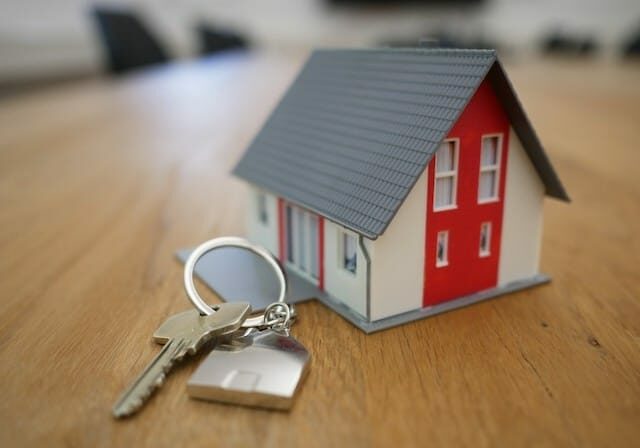
Whether you’re property hunting by yourself or working with real estate professionals, the first step is to set your budget and identify what kind of property you would like to purchase. Here are some suggestions on how best to proceed:
- If you want to capitalize on the bustling rental and Airbnb market and make excellent returns on your property investment, opt for an apartment in the center of town. The center of Lisbon is a major tourist destination, making it a great option for those searching for properties that will provide rental income.
- If you want to rent to young professionals, choose an apartment in one of the quieter neighborhoods. They will likely be looking to rent for the longer term.
- Visit the different neighborhoods in Lisbon to find out which part of the city you personally like.
- Once you have honed your search, visit some properties to see them firsthand and see if one stands out.
Step 3: Buying property in Lisbon
After you have found the perfect property and finalized the price with the owner, you will need to tick all the formalities required when it comes to the contract.
Purchasing foreign real estate can be a complex process, so we highly recommend working with an experienced lawyer who will be able to help you with the process. You will need to review the terms and conditions of the promissory contact with your lawyer, which will then be signed by yourself and the seller. At this point in time, you will need to pay a deposit. This is usually 10 percent of the cost. If you back out of the deal at this stage, you will lose your deposit.
Step 4: Signing the Promissory Contract
When the promissory contract is ready and the term has been met, the buyer and the seller, alongside their lawyers, will meet before a notary and finalize the sale. At this stage, the buyer will pay the remaining amount that is owed on the property, and the seller will give the buyer the keys to the property.
Step 5: Paying fees and complying with property tax obligations
Real estate agents will always guide you on the formalities of paying property taxes. However, as a general guideline for Lisbon real estate in Portugal, the seller usually pays the agency fees. Still, the purchasing property buyer also will have to pay additional costs and fulfill property tax obligations:
- IMT (Property Transfer Tax) is a municipal property tax based on the purchase price and your situation. For example, for a non-resident buying a second or third home, this can be as high as 10 percent of the purchase price.
- Stamp duty: A fixed rate of 0.8 percent of the property’s purchase price.
- Notary and land registration fees: Usually between 0.2 percent and 1.2 percent of the property’s value.
- Wealth tax: For properties with a taxable value of more than €600,000. The wealth tax rate is tiered based on the property’s value:
0.4 percent for properties held by companies, 0.7 percent for properties owned by individuals, and 1 percent for properties owned by individuals with a taxable value exceeding €1 million.

Exploring Visa and Immigration Options for Portugal
If you're considering making the move to Portugal, it's essential to be informed about the various visa and residency options available. The Golden Visa Portugal program is an attractive option for many, offering residency to investors and their families. For those eyeing retirement in this beautiful country, the Portugal D7 Visa is tailored for you. Digital nomads can take advantage of both short and long-stay options with the Digital Nomad Visa (D8).
For the entrepreneurial spirit, Portugal offers the Entrepreneurship/startup Visa (D2) - Start-up Visa (open company) tailored for those looking to establish their businesses in the country. Those with specialized skills can explore the Work visa for highly qualified employees (D3). Additionally, if you have Portuguese ancestry, you might be eligible for Citizenship by descent.
However, moving to a new country isn't just about visas. If you're thinking of buying property, our guide on Buying Property in Portugal can offer invaluable insights. Dive deeper into the immigration process with our comprehensive Portugal immigration guide. For Americans specifically looking to relocate, we have curated information on Americans moving to Portugal. Lastly, one can't forget the importance of the NIF (Tax Identification Number), a crucial step in any relocation process.
Frequently Asked Questions about Buying Property in Lisbon, Portugal
Is it expensive to buy a house in Lisbon?
The price of property in Lisbon apartments and homes has climbed exponentially in the past three years. However, there are still some bargains when it comes to buying property in Lisbon away from the most expensive areas. You’ll find the prices of property cheaper in up-and-coming areas such as Avenida, Baixa, and Principe Real, each offering your potential dream property to own.
Is it expensive to rent a house in Lisbon?
Rent in Lisbon is a bit on the high side when compared to the salaries paid. The average rent in Lisbon for a one-bedroom apartment ranges between €800 to €1500. However, when this is compared to other major European cities, it is relatively cheaper.
Why choose Lisbon over other European cities?
Lisbon is an emblematic capital city with a rich history, buzzing nightlife, renaissance architecture, affordable cost of living with a high-quality life and also cosmopolitan.
Are there any international schools in Lisbon?
There are a number of international schools in Portugal, and several of them are located in Lisbon. The new British School of Lisbon is located in Cais do Sodre, very close to Baixa and Chiado, and there are a number of others located slightly further out of the city.
Is it better to buy or rent in Lisbon?
Depending on your circumstances, it can be better to buy property in Lisbon. Rent in Lisbon is relatively expensive in comparison to average salaries, and paying a Portuguese mortgage can be a logical choice.
It’s worth noting that banks in Portugal will typically be willing to lend at least 60 percent of the property value for a mortgage. Depending on the property type, whether you have residence status in Portugal, and your financial profile, some banks may be willing to lend a high proportion of the property value.
Since the real estate market in Lisbon is experiencing a period of stable growth, a real estate investment can be a good option.
What are the most popular areas to buy property in Lisbon?
The most popular areas to buy property in Lisbon are in the center, around Baixa, Avenida, Bairro Alto and Principe Real.
Is property in Lisbon expensive?
In comparison to other capital cities in Western Europe, property in Lisbon is comparatively inexpensive. The average price of property in Lisbon City is €5,139 per square meter.
Is it a good idea to invest in property in Lisbon?
Property in Lisbon has become increasingly popular with investors, leading to a new wave of investment into the city over the past few years due to a combination of different factors. The relatively low costs against high returns and stable growth in the real estate sector mean that now is a good time to invest in Lisbon property.
Is Lisbon property a good investment?
Yes, Lisbon has become very popular for real estate investment over the years. Although real estate prices are increasing, if you’re interested in investing in a commercial property, you should be able to find relatively low-cost properties with strong returns and stable growth, representing an excellent financial investment.
Can foreigners buy property in Lisbon?
Foreign property ownership is not restricted in the Portuguese real estate market. However, if you apply for the Portugal Golden Visa, residential real estate in Lisbon would not be a qualifying investment.
It is also important to note that you must pay capital gains tax to sell your property.
The amount you would pay in capital gains tax would depend on how you own the property, whether the property is your primary residence and your residence status.
Is real estate expensive in Lisbon?
Compared to many other Western European cities, properties in Lisbon are very affordable. However, prices have been increasing in recent years.
Where is the best place to live in Portugal?
Lisbon is a dynamic, cosmopolitan city to live in Portugal. Elsewhere, Porto is a good place for history lovers, while the Algarve remains a firm favorite with expats, given its excellent weather and beautiful beaches.
Property in Lisbon, Porto or Algarve is a lucrative market and checks all the boxes that investors are looking for.
What is the current state of Lisbon's real estate market?
The Lisbon real estate market exhibits robust growth, characterized by significant price increases due to heightened demand from tourism and tech sectors. However, affordability concerns are mounting, prompting speculation on future trends.
While rising interest rates and potential economic slowdown could lead to price adjustments, the sustained supply-demand imbalance suggests continued market resilience.
Long-term projections remain uncertain, requiring close monitoring of economic and financial factors.
Is buying property in Lisbon a good investment?
Investing in property in Lisbon can be a lucrative venture for various reasons. The Portuguese real estate market has shown a consistent upward trajectory, making it an attractive option for investors. Lisbon’s unique blend of historic charm and modern amenities, coupled with its growing prominence among Western European capitals, contributes to sustained demand.
Where to buy cheap property in Lisbon?
If you are looking for more affordable property investment options in Lisbon, certain neighborhoods provide a cost-effective entry into the Portuguese real estate market. Areas such as Marvila and Beato, located in the city’s eastern part, are gaining attention for their emerging urban development and relatively lower property prices compared to more central districts. Additionally, parts of Alcântara and Ajuda on the western side offer affordability without compromising accessibility.
What are the hidden costs of buying property in Lisbon?
Real estate agents in Lisbon will always provide guidance on additional costs such as municipal tax or stamp duty. However, as a general guideline hidden costs can include legal fees, notary fees, registration fees, property inspection fees, and potential maintenance costs. It’s important to budget for these additional expenses to avoid surprises when buying property in Lisbon.

